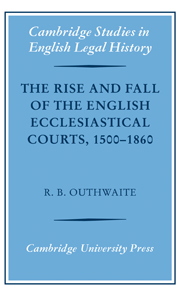Book contents
- Frontmatter
- Contents
- Foreword by R. H. Helmholz
- Preface
- Table of parliamentary statutes
- List of abbreviations
- 1 The ecclesiastical courts: structures and procedures
- 2 The business of the courts, 1500–1640
- 3 Tithe causes
- 4 Wills and testamentary causes
- 5 Defamation suits
- 6 Marital suits and marriage licences
- 7 Office causes
- 8 The roots of expansion and critical voices
- 9 Charting decline, 1640–1830
- 10 Explaining decline
- 11 The bills of 1733–1734
- 12 Snips and repairs: small steps to reform, 1753–1813
- 13 Royal commissions and early fruits, 1815–1832
- 14 Reform frustrated
- 15 Reforms thick and fast, 1854–1860
- Select bibliography
- Index
10 - Explaining decline
Published online by Cambridge University Press: 21 January 2010
- Frontmatter
- Contents
- Foreword by R. H. Helmholz
- Preface
- Table of parliamentary statutes
- List of abbreviations
- 1 The ecclesiastical courts: structures and procedures
- 2 The business of the courts, 1500–1640
- 3 Tithe causes
- 4 Wills and testamentary causes
- 5 Defamation suits
- 6 Marital suits and marriage licences
- 7 Office causes
- 8 The roots of expansion and critical voices
- 9 Charting decline, 1640–1830
- 10 Explaining decline
- 11 The bills of 1733–1734
- 12 Snips and repairs: small steps to reform, 1753–1813
- 13 Royal commissions and early fruits, 1815–1832
- 14 Reform frustrated
- 15 Reforms thick and fast, 1854–1860
- Select bibliography
- Index
Summary
It seems clear that once the backlog of causes built up in the 1640s and 1650s was reduced, levels of activity in the ecclesiastical courts settled generally at levels below those that prevailed in the years before 1640. This occurred despite the fact that some special ecclesiastical commissions – the High Commission being the most conspicuous – were not restored in the 1660s, and that these courts must previously have siphoned off some considerable number of cases from the ordinary church courts. Subsequent decline in levels of activity appears to have come in stages, stages that may well have been different from court to court and for different classes of litigation. Prosecution of religious dissent collapsed after 1687 and with this collapse came an increasing reluctance on the part of churchwardens, now the principal instigators of such actions, to charge parishioners with sexual immorality. Such actions did not disappear at once; they were still to be found in the eighteenth century and frequently dominated office prosecutions, though they did so at far lower levels than had prevailed before 1640. They appear to have survived longest, and in greatest number, in jurisdictions where economic change was least evident, where small village and modest urban communities prevailed, in those ‘face to face’ communities where reputation clearly mattered. They disappeared earliest in the large and expanding towns, and in those rural industrialising areas where a high proportion of the population consisted of young immigrants flocking in to take advantage of expanding economic opportunities and where greater degrees of anonymity probably prevailed.
- Type
- Chapter
- Information
- Publisher: Cambridge University PressPrint publication year: 2007



